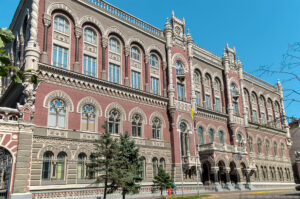
The National Bank of Ukraine (NBU) last week increased the sale of dollars on the interbank market by $124.5m, or 21.6%, to $700.9m, according to statistics on the regulator’s website. According to the NBU, for the first four days of last week, the average daily negative balance of purchase and sale of foreign currency by legal entities increased to $71.3 million from $58.2 million for the same period a week earlier and totaled $285.3 million.
On the market of foreign exchange transactions of households, the negative balance, on the contrary, decreased to $33.4 million on Saturday-Thursday from $43.4 million the week before last, and all days the sale of non-cash currency exceeded its purchase.
The official hryvnia/dollar exchange rate, which started last week at UAH 41.9782/$1, weakened to UAH 42.0641/$1 in three days, but ended the week at UAH 42.0423/$1.
In the cash market, the dollar exchange rate over the past week changed over the trajectory of the official one, and in general, the dollar rose by about 12 kopecks during the week: buying – to UAH 41.86/$1, and selling – to UAH 42.23/$1.
Analysts of the multi-service FinTech platform KYT Group, which is a major player in the cash FX market, noted a gradual depreciation of the hryvnia, but under full control of the National Bank, which is helped by record international reserves and last week’s receipt of another EUR5.9 bln from the EU.
According to their forecast, short-term (1-2 weeks) the hryvnia will be in the base range of 41.8-42.5 UAH/$1 with likely gravitating towards the upper boundary of the forecast.
“Medium-term (2-3 months) – 42.0-42.9 UAH/$1. Now there is every reason to strengthen the dollar in the international market, where positive sentiment reigns because of the understandable easing policy from the Fed. But for Ukraine the main role will be played by such factors as the situation in the energy sector, further possible advances of the RF Armed Forces troops on the territory of the country and stability of financial aid receipts from partners”, – KYT Group believes.
Long-term (6+ months), the company maintains the forecast scenario of hryvnia devaluation. Subject to timely and rhythmic receipt of international aid, they cite as a benchmark range of 43.40-44.60 UAH/$1 until mid-2026, taking into account the current context of the military and political situation in Ukraine.
Source: https://bank.gov.ua/ua/markets
https://interfax.com.ua/news/projects/1120665.html

In its October inflation report, the National Bank of Ukraine increased its estimate for the grain and legume harvest in 2025 to 61.5 million tons from 57.9 million tons in its July report, but lowered its estimate for the oilseed harvest to 19.3 million tons from 21.0 million tons.
“According to the NBU’s assumptions, in 2026-2027, grain and legume harvests will grow thanks to further increases in agricultural productivity and an increase in corn and other grain crops in regions less affected by climate change,” the document says.
However, according to the National Bank, the harvest of oilseeds, which are mainly grown in the southern regions, will be lower due to the negative impact of climate change, exacerbated by the long-term consequences of the destruction of the Kakhovka hydroelectric power plant for the region’s irrigation systems.
“The security situation in the frontline regions of the south will continue to have an impact, worsening conditions for the 2026 sowing campaign and slowing down the pace of land demining,” the report also says.
As a result, the National Bank has improved its grain harvest forecast for 2026 from 59.6 million tons to 62.9 million tons, and for 2027 from 60.4 million tons to 63.5 million tons.
At the same time, oilseed harvest expectations have been reduced to 21.4 million tons next year from 22.0 million tons, and to 22.2 million tons in 2027 from 22.8 million tons.
“However, the NBU expects the livestock sector to continue to make a negative contribution to agricultural value added due to a further reduction in livestock numbers (with the exception of poultry),” the report also notes.
According to the State Statistics Service, the volume of early crops (wheat, barley, rapeseed, legumes) as of October 1, 2025, reached 32.6 million tons, while the 2024 harvest yielded 31.9 million tons (+2.1%). The current growth is primarily due to higher yields of wheat (+3.9%) and legumes (+35%), while the barley harvest has practically reached last year’s level (-0.6%), and the rapeseed harvest is 10.7% lower than last year.
Earlier, the Experts Club analytical center made a video analysis of wheat production by the world’s leading countries for the period 1991-2024.

The chairman of the supervisory board of SK Veles (Odessa), Suren Sardaryan (who owns 56.249% of the insurer’s shares), and member of the supervisory board Karini Sardaryan (42.918%) have submitted their resignations. This was reported in the company’s information posted on the NSSMC information system. It is also specified that they held these positions from April 28, 2023, to May 16, 2025, and are currently vacant.
As reported, on May 5, 2025, the National Bank of Ukraine imposed sanctions on Veles Insurance Company (Odessa) for submitting its 2024 financial statements to the NBU after the deadline.
Veles Insurance Company has been operating in the market since 1998. It has 15 licenses for voluntary and compulsory types of insurance. It is a member of the Insurance Business Association. Its authorized capital is UAH 39 million.
member of the supervisory board, NATIONAL BANK OF UKRAINE, Veles Insurance Company

The National Bank of Ukraine (NBU) has improved its forecast for the electricity deficit in Ukraine this year from 4% to 3% and next year from 2% to 1% thanks to rapid repairs and the development of distributed generation.
“Quick repairs to maneuverable generation and energy infrastructure, the development of distributed electricity generation and renewable energy capacity, against the backdrop of sustained electricity imports, allow us to improve the estimate of the electricity deficit over the forecast horizon,” the NBU stated in its Inflation Report for April 2025, comparing it with the January report.
According to Nabank, the deficit will almost disappear in 2027 (1%).
Thus, the report states that the impact of energy supply constraints on real GDP growth will decrease, and annual electricity imports in 2025-2027 will amount to about $0.5 billion.
As reported, at the end of 2024, the Ministry of Energy reported that the total capacity of distributed gas generation facilities connected in Ukraine last year amounted to 967 MW, of which 835 MW were commissioned in 2024.

The National Bank of Ukraine (NBU) has strengthened the official hryvnia exchange rate against the US dollar by 12 kopecks after the official hryvnia/US dollar exchange rate rose by 8 kopecks on Thursday. – to 41.4313 UAH/$1, according to data on the regulator’s website.
“The dollar exchange rate is expected to remain within the range of 41.50-42.20 UAH/$1. The main factors that will influence the market will be the NBU’s decision on the discount rate on March 6 and the US Fed policy,” analysts at currency exchange market operator KYT Group shared their expectations for the coming weeks in their February review.
In their opinion, the hryvnia may gradually weaken in spring, in particular, if the foreign trade deficit grows. Analysts forecast an average corridor for the U.S. dollar in the range of UAH 42.50-44.00/$1.
“The main risks remain possible delays in international financial assistance and the growth of the budget deficit,” KYT Group said.
The hryvnia-US dollar exchange rate will be at 44.50-45.50 UAH/$1 by the end of the year, experts believe.
The NBU set the reference rate at 41.4341 UAH/$1 at 12:00 Friday against 41.5274 UAH/$1 on Thursday.
Meanwhile, the dollar in the cash market has fallen in price today: when buying its rate decreased by 3 copecks, to 41.53 UAH/$1, and when selling – by 1 copeck, to 41.64 UAH/$1.
As reported, the Cabinet of Ministers has set the average annual indicator of the official exchange rate of the hryvnia to the US dollar in the state budget of 2025 at the level of UAH 45/$1.
In the 2024 budget, the government budgeted an annual average of 40.7 UAH/$1, and at the end of the year – 42.1 UAH/$1. The hryvnia weakened by 10.6% or UAH 4.02 to UAH 42.0390/$1 at the official exchange rate last year.
Ukraine’s international reserves as of February 1, 2025, according to preliminary data, amounted to $43 billion 3.1 million, in January they decreased by 1.8%, or $785 million, and net international reserves (NIR) – by $0.79 billion, or 2.7% – to $28.313 billion.
Source: https://interfax.com.ua/news/projects/1051560.html

The National Bank of Ukraine says it is implementing the largest package of easing currency restrictions for businesses since the start of the full-scale war to improve the conditions for doing business in Ukraine and the entry of domestic businesses into new markets, as well as supporting economic recovery and facilitating the inflow of new investment into the country.
“First, all currency restrictions on imports of works and services are abolished. Second, the ability of businesses to repatriate ‘new’ dividends is ensured. Third, the possibility to transfer funds abroad on leasing/renting is provided,” the NBU said in a press release on Friday evening.
“Fourth, restrictions in terms of repayment of new external loans are relaxed. Fifth, the possibility to repay interest on ‘old’ external loans is provided. Sixth, restrictions in terms of transferring foreign currency from representative offices in favor of their parent companies are relaxed,” the regulator added.
It is specified that these and a number of other technical changes were introduced by the NBU Board Resolution No. 56 of May 3, 2024 to the so-called “military” Resolution No. 18 of February 24, 2022. The vast majority of the document’s provisions come into force from May 4, 2024, and only in terms of repatriation of new dividends – from May 13, 2024.
The regulator believes that this will support Ukrainian producers and provide them with the opportunity to enter foreign markets, which in turn will contribute to a gradual increase in export revenues.
It is indicated that repatriation of dividends by businesses will be allowed only for dividends accrued based on performance after January 1, 2024.
“This relaxation does not apply to the payment of dividends at the expense of retained earnings for previous periods or reserve capital,” emphasized the National Bank.
In addition, the regulator set a monthly limit for repatriation of “new” dividends at EUR1 million equivalent in order to minimize risks to macro-financial stability. It is noted that control over compliance with this norm will be ensured thanks to the NBU’s automated information system “E-limits”.
“Providing an opportunity to repatriate “new” dividends will contribute to the inflow of new investments in Ukraine, minimize the risks of curtailing the activities of enterprises with foreign capital and support the economy,” the National Bank believes.
As for the easing of restrictions on servicing and repayment of “new” foreign loans and repayment of “old”, the NBU has reduced the minimum period of use of the loan, the funds for which come from abroad after June 20, 2023 on the accounts of residents, from three to one year, when reaching which it is allowed to buy foreign currency for its repayment. Thus, the ban on the purchase of foreign currency for repayment of “new” loans will apply to loans for up to one year.
In addition, the NBU will allow businesses, regardless of the period of use of “new” loans to buy foreign currency to pay interest on them.
“All this will contribute to increasing opportunities for Ukrainian businesses to attract new external loans not only from official partners, but also from private investors,” the release said.
Moreover, according to it, resident borrowers will be able to make transfers in foreign currency to repay interest on “old” external loans, which, according to the terms of the agreement, are payable from February 24, 2022. However, under one loan agreement for interest payments overdue as of May 1, 2024, borrowers will be able to transfer no more than 1EUR million equivalent per calendar quarter.
Also, according to the release, legal entities and individual entrepreneurs will be able to transfer funds abroad for settlements under leasing or rental contracts without additional restrictions on the subject of such a contract, as well as the date of its conclusion.
The National Bank reminded that previously such permission was only for leasing or renting vehicles.
Regarding the permission for representative offices of foreign companies to transfer foreign currency to the accounts of parent companies, it is specified that the central bank will allow international card payment systems and foreign airlines to buy and transfer foreign currency abroad to the account of a non-resident legal entity, but for such operations will be set a monthly limit of EUR5 million in equivalent.
According to the regulator, this will contribute to further development of cashless settlements in Ukraine.
ACTIVITIES, BUSINESS, CURRENCY, ECONOMY, INVESTMENTS, NATIONAL BANK OF UKRAINE, UKRAINE